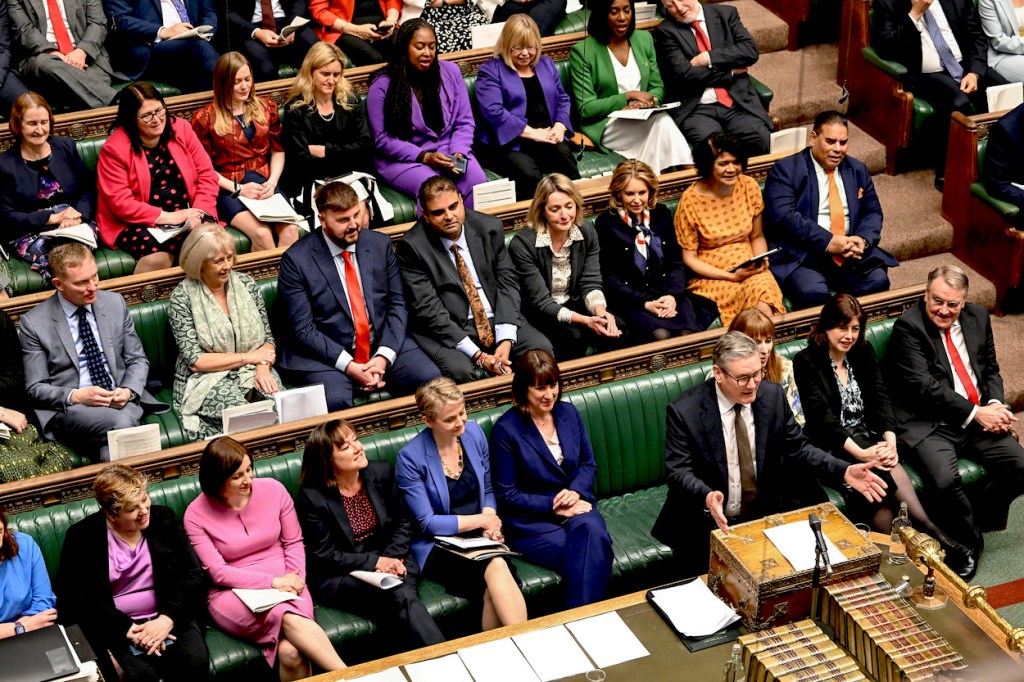
In a week where political attention was on espionage and anti-Semitism, the cri de coeur from one Treasury official was notable. Recalling how Budgets were made during the years of Gordon Brown, before the 2010 coalition created the Office for Budget Responsibility (OBR), the number-cruncher complained: ‘All they had to do was fiddle their own figures. That was a dream compared with this.’
Earlier this month, Rachel Reeves received the OBR’s first estimate of the state of the public finances, showing the depth of the ‘black hole’. She will shortly get another OBR report on how falling productivity is damaging growth. For every 0.1 per cent productivity growth is downgraded, the Chancellor will lose £9 billion by 2029-30 – the crucial year which determines if Reeves sticks to her fiscal rules.
Everything you hear about the Budget will be Reeves hitting balls with topspin at four ‘opponents’
A former cabinet minister is fond of saying: ‘Politics is like tennis, except that the government always has serve.’ The problem is external events – the recent China spy scandal and the Maccabi Tel Aviv affair – have a habit of distracting the server. Those who will judge Reeves’s economic handiwork have the ability to hit the ball back hard. Everything you hear about next month’s Budget will be Reeves and her team hitting balls with topspin at four different ‘opponents’. The OBR is only the first.
Reeves used her visit to the International Monetary Fund meetings in Washington D.C. last week to say there will be tax rises. This statement was directed at her second target, the markets. ‘We needed to confirm we are going to be raising tax to reassure the markets we are serious about consolidation,’ an aide says.
Sky’s Sam Coates managed to engage the usually hyper-cautious Chancellor on the need to escape the ‘doom loop’ of forecast downgrades and tax rises. This was designed to signal that Reeves would like to increase the ‘headroom’ in her economic plan from £9.9 billion (though the exact amount depends on the OBR). ‘Going forward, she does want to build more resilience in the economy,’ the aide says, arguing this intervention calmed bond traders. ‘If you look at the cost of borrowing over the past two weeks it’s fallen significantly.’
Reeves later told the Guardian she would rinse the rich. She didn’t put it quite so indecorously, but that was a dog whistle aimed at Labour MPs and activists – her third audience. The bit she didn’t say out loud was whether this was a pitch rolling exercise for wealth taxes or a statement of values to keep MPs quiet while she plots a tax raid that will hit almost everyone. It’s probably both.
Reeves admitted there would be some ‘cuts’, but it’s clear these will be a small part of the package. ‘We’ve got to cut waste and we’ve got to cut non-priority spending,’ a senior figure says. ‘But I don’t imagine there will be a huge amount in the Budget. I don’t think we’re going to be able to announce welfare reforms ahead of 26 November.’
Reeves and Starmer have also been announcing a range of measures to convince the OBR and the markets they can raise growth. These include deregulation, government amendments to the Planning and Infrastructure Bill and the UK-India trade deal. Reeves wants these measures ‘scored’ by the OBR ‘in the low billions’. But as one ally admits: ‘They might score none of it.’
The next phase of the pitch-rolling exercise will doubtless see a strategic leak of the OBR’s estimate of the productivity crisis and the size of the black hole. Officials are dismissive of predictions of the number, the latest being the Institute for Fiscal Studies think-tank, which put it at £22 billion. ‘There are a lot of people who think they know what’s going on; they just don’t,’ says one insider. ‘Their numbers are total garbage.’
What is certain is Labour will try to win over its fourth audience, the public, by directing the blame elsewhere. ‘The crucial thing is for people to understand what has changed since the Budget last year,’ a Treasury source argues. ‘Firstly, the costs of borrowing across the world have gone up, and that is to do with trade barriers [blame Donald Trump], conflicts in different parts of the world [blame Russia and Hamas]. The second thing is the welfare changes [blame MPs who overturned planned cuts]. The third thing is the productivity review [blame the Tories]. It’s looking back over the past ten years, not anything we’ve done in the last year.’ Blame ‘austerity’ and the Conservative ‘Brexit deal’, with supporting roles for ‘a war in Europe and a global pandemic’.
Starmer and Reeves looked at polling, which shows the public thinks Brexit was a mistake, and attacked Nigel Farage who made it happen and ‘walked away’ afterwards. ‘Our polling suggests the public are willing to hear us level with them about the problems,’ the source adds. But touching the third rail of British politics comes with risks.
The floating of potential tax rises is under way. On Wednesday the Times suggested Reeves would target limited liability partnerships, hitting hedge fund managers and GPs. Pensions and capital gains tax are other obvious targets. In each case Reeves will have to decide if the money raised is worth the political row. This is where Starmer and his team will have more oversight than before. Having acquired a personal economic adviser and a principal private secretary with a Treasury background, a No. 10 source says: ‘Keir is much more involved in the detail this time.’ It will ultimately be his call whether income tax rises are the fairest solution, even if they breach Labour’s manifesto.

The problem for Reeves and Starmer is that, while their immediate concerns focus on the OBR and the markets, the public is the trickiest of the four audiences. Starmer’s electoral coalition from 2024, like Boris Johnson’s in 2019, was a mile wide and an inch deep. Despite praise for the PM’s conference speech, little has changed for Labour in the polls. A former No. 10 adviser observes: ‘There is a problem for Labour of trying to tack right to head off Reform and then dealing with the Green surge. Can you call Farage racist to rally the base, blame Brexit for tax rises and then try to stop people moving to Reform?’
The bigger risk comes if Reeves fails to convince voters she is not to blame for the tax rises. Then all four audiences will bite back. A senior source concludes: ‘In politics you’re either in a fight of your choosing or you are the target of someone else’s.’









Comments